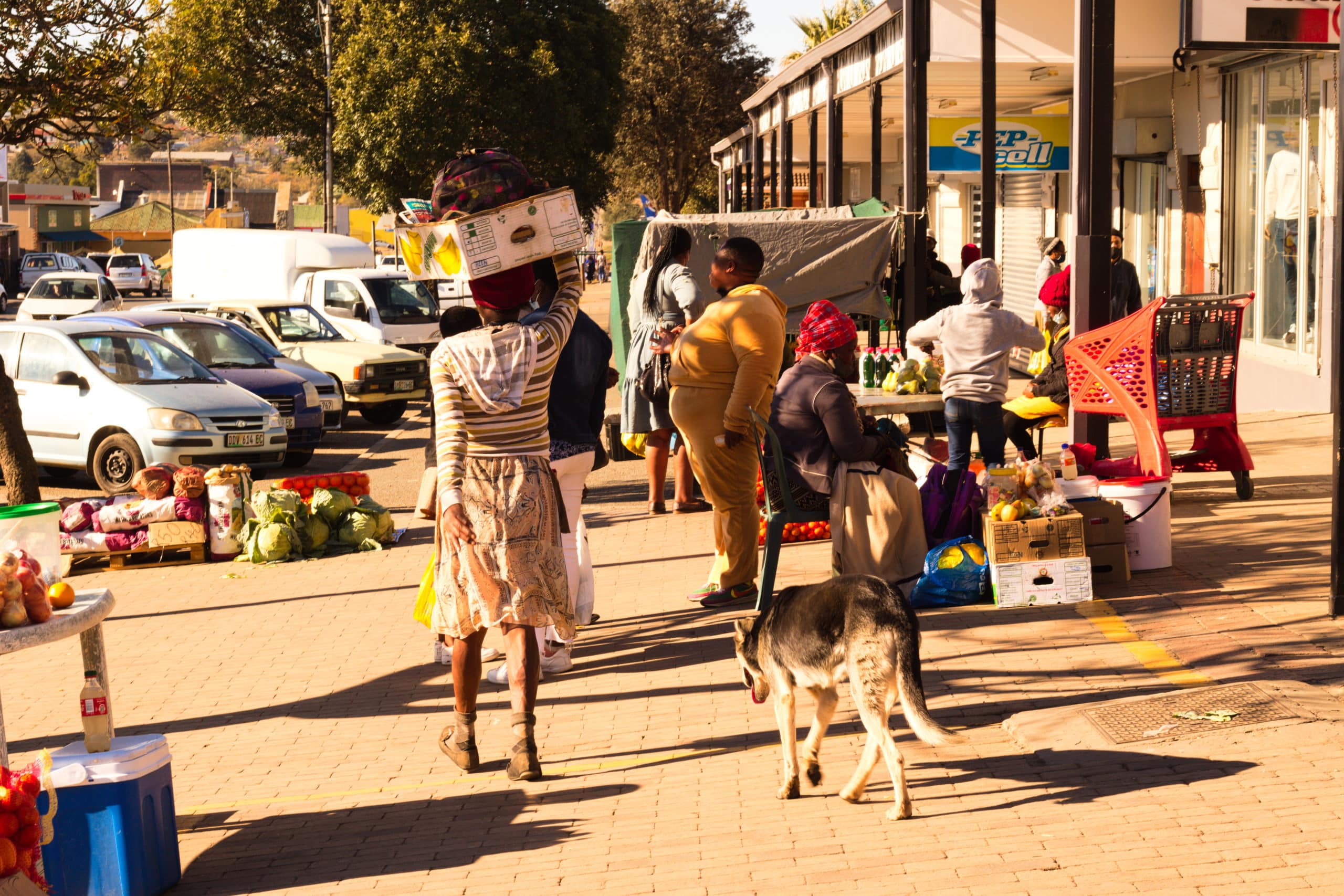The beating heart of South Africa’s inner cities are the street vendors. They keep commuters fueled with fresh fruit, cooked food and drinkable water. They feed tired souls and also repair the tireless soles of those walking to and from work. They continue the legacy of indigenous practices by selling traditional African goods. They represent the niche and the creative in Africa, also selling the staples essential for survival to the working masses, often unrecognized and excluded from the mainstream financial sector. These micro-entrepreneurs offer the candor, culture and character to South Africa’s thriving informal economy.
The International Labour Organization (ILO) explains the informal economy as: “All activities that are, in law or practice, not covered or insufficiently covered by formal arrangements; the notion of exclusion lies at the heart of these parameters–that it refers to working people who are largely excluded from the exchanges that take place in the recognized system.”
Informal work is precarious work. By its nature, profits may vary wildly from week to week. The scarcity of spots to sell goods may limit opportunities. And infrastructure may be lacking–ablution facilities, storage, and access to electricity. Street vendors also face health impacts from exposure to outdoor air pollution, poorly-ventilated spaces and exposure to biomass fuel from cooking on gas or open fires.
Informal workers are excluded from the provisions of South Africa’s Occupational Health and Safety (OHS) Act because there is often no employment relationship or they work in unconventional workplaces such as urban public spaces. South Africa has ratified the ICESCR, CEDAW and the ILO Occupational Health and
Safety Convention, which requires member states to extend OHS protection to informal workers.
Street vendors also face the grim reality of crime on Johannesburg’s streets. In a quiet alley in Westdene, fruit-seller Thabang Tlou placed his phone down while helping a customer, only to have it stolen. Early in 2023, someone stole his trolley for transporting goods.
Loading...
On a busy street in the city’s Central Business District (CBD) on a Saturday in autumn, a man gets choked by two men stealing his valuables while four men stand guard, which this reporter was witness to. He staggered away, barely keeping consciousness. Staying alive in the city is the consolation prize for surviving violence.
Street vendors can also help maintain the social fabric of an area. Markets like Kwa Mai-Mai in the Johannesburg CBD remain safe because the community bands together and keeps an eye on everything that happens within the walls of the stalls and shops. It’s unsafe to hold or carry cash, yet it continues to be the predominant medium of payments and transactions.
The white paper, titled Driving Financial Inclusion In South Africa’s Informal Economy: The Landscape At The Bottom Of The Pyramid, published by FORBES AFRICA Insights, in association with Mastercard in May, found that cash continues to be king in the informal sectors, among both consumers and Small and Medium Enterprises, in South Africa.
Hundred percent of the over 250 respondents of consumer surveys for the white paper said they used cash to pay bills (municipal, utility, airtime) and for shopping but in 2022, those who “sometimes or regularly used a payment facility other than cash were asked why they preferred these options over
cash, with 91% saying it is not safe to touch cash because of Covid, 60% saying it was more convenient to use a credit card, 26% saying it is more convenient to use a phone, and 25% citing safety for not carrying cash”.
Essentially, both vendors and consumers struggle with the dilemma of carrying cash as a safety issue, but
cash remains central to the operating of South Africa’s informal sector.
The Women In Informal Employment: Globalizing and Organizing (WIEGO) reports that two billion people
worldwide work in informal employment.
According to data from 2021 from StatsSA, jobs in the informal sector in South Africa account for nearly one-third of the national total, highlighting the sector’s importance for reducing poverty. It has been estimated to contribute about 6% of the GDP.
As a street vendor, you are covered by national law, The Business Act 71 of 1991. While this act says you don’t need a licence to trade, it does give local municipalities authority to make by-laws. These regulate where and how street vendors trade and under what conditions; including paying for a permit or license.
As an informal trader, the existing by-laws often consist of confusing technical and legal speak. Some of these include Health Department regulations on health standards if you are involved in the preparation and selling of food, Zoning Scheme Regulations that say where informal trading is allowed, and by-laws relating to streets, public places and prevention of nuisance, reports WIEGO.
According to the Gauteng Informal Business Upliftment Strategy from 2016, by the Gauteng Province Economic Development, a number of issues were raised on the by-laws implemented by municipalities. These are namely that municipalities do not train informal traders on the by-laws, rather they harass and confiscate goods, that by-laws need to be standardized across municipalities, that there is a lack of communication across law enforcement, municipalities and informal traders, and that there is a high level of corruption from municipal officials on the implementation of by-laws.
Pritch Nzirah, a Zimbabwean immigrant selling handmade dog beds and assorted goods, tells FORBES AFRICA that goods were confiscated from him and his mother prior to receiving their permit to trade. Now, after going through the technically complex process, they are protected by law. The informal economy in sub-Saharan Africa is the second-largest in the world, after Latin America and the Caribbean.
From 2010 to 2014, sub-Saharan Africa’s informal economy accounted for 38% of GDP to the region, according to the International Monetary Fund.
The white paper published by FORBES AFRICA Insights, in association with Mastercard, reported that in 2022, 96% of businesses used cash to buy stock, with 4% indicating cash is less safe, but these micro-enterprises are slowly wanting to switch. There is definitely a shift in sentiment with a majority likely/extremely likely to start offering their customers digital and online payments to help them grow their business.
Only two vendors interviewed for this article used alternative cashless payment methods to cash. The owners of Perfect Smart Coffee offers Snapscan as a method of payment as well as a card machine, while Cloe Berry, who sells hand-painted clothes, uses a Yoco card machine.
“We basically use a card machine and sometimes take cash, now and then. We transitioned to card machine because that was the rule of the market [The Playground] for clients to pay using card machine,” says Berry to FORBES AFRICA. Berry uses a Yoco device (from a South African-based fintech company that has spread through the country), making it easier for entrepreneurs to get paid. Yoco Go connects to a smartphone via Bluetooth using the Yoco App. The customer pays by tapping, swiping or inserting their card. All a vendor like Berry needs is a working smartphone.
In 2023, the City of Johannesburg’s digitized informal trading permits allow informal workers to register and apply for a trading licence electronically. The City of Johannesburg says this new policy recognizes that informal trading is creating employment, unlike its earlier version.
While the digitized trading informal permits represent progress in recognizing informal traders, the City of Johannesburg still has a way to go with integration. One million to two million new jobs will be in the informal sector by 2030, South Africa’s National Development Plan estimates. This creates potential
challenges down the line to adequately protect existing and future workers. Informal workers mainly sell wares and services in central or secondary business districts and townships. And Johannesburg in Gauteng, mythologized as the land of milk and honey, is an attractive place for all ages to try and make a living and a life. Though the city can seem heartless, street vendors are a visible thread of community and creative survival.
On the following pages, we take a tour of the city’s inner precincts to offer you snapshots of their hustle,
their working lives, a slice of their every day.
Isaac Sakhile Mpungose
In Maboneng in the Johannesburg CBD is a colorful market, Kwa Mai-Mai, which comes alive every weekend, brimming with people drinking and eating, cow-heads being transported for cooking, and rows of stalls dedicated to traditional items and muthi (traditional medicine).
At shop number 9 in the market is a seller of traditional Zulu items. Isaac Sakhile Mpungose, aged 49, from Maphumulo in South Africa’s coastal KwaZulu-Natal province, takes pride in how his wares are presented.
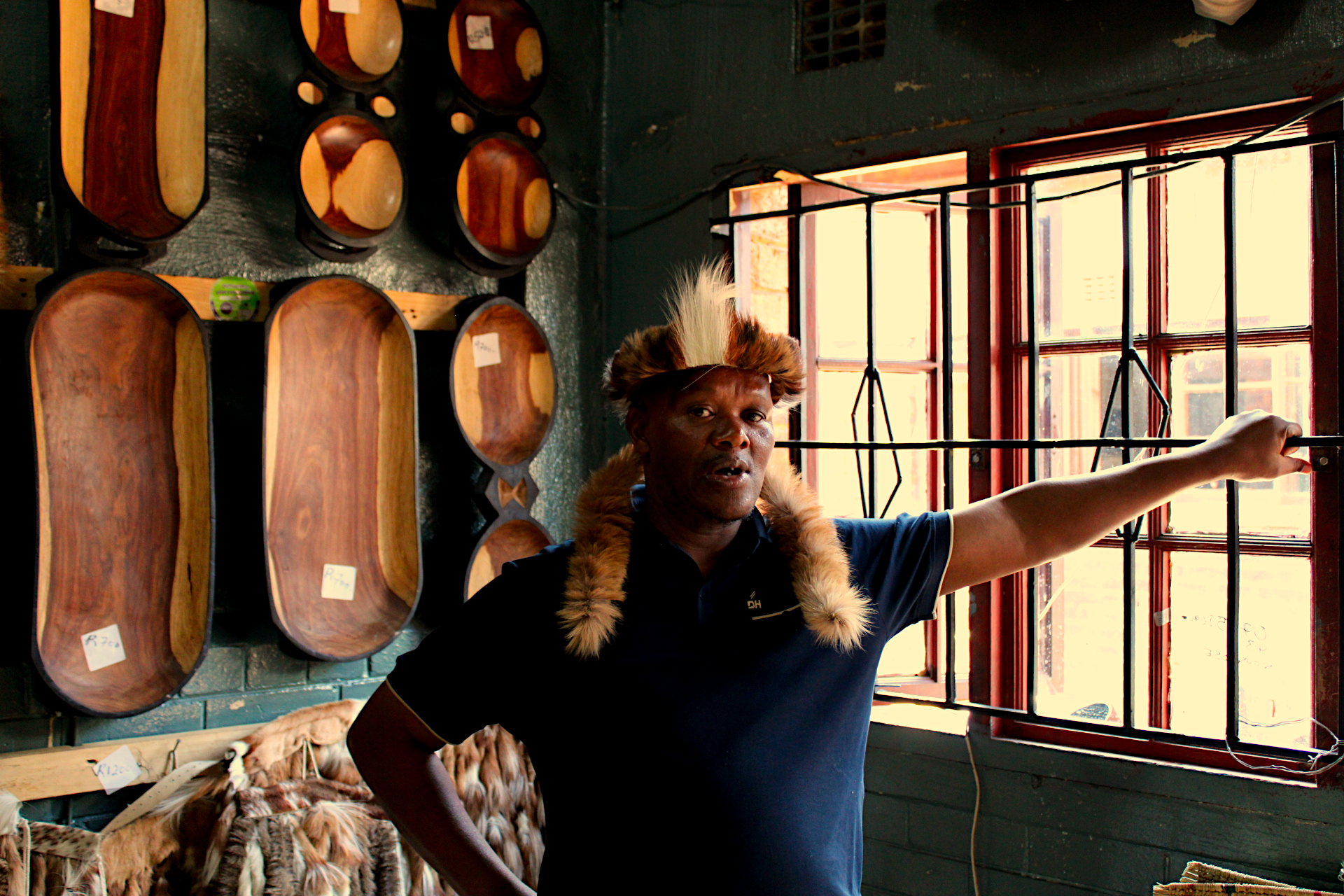
The outside displays sandals and knobkerries (traditional wooden clubs), and the inside of his small shop sells isithebe (placemats for children to eat on) and iingqwembe (wooden dishes for serving meat), as well imiqhele (traditional headband for Zulu men) and round bowls for umqombothi (traditional beer). There are also a few animal skins scattered around.
Mpungose has been selling traditional Zulu items for four years. He makes an average of R1,000 ($52) per month. “After Covid, it gets better. Because everyone was locked in [their] house, no one was allowed to go outside and the business was low. We didn’t even get R10 ($0.50) on those days. After Covid, it’s much better now, people are coming from different places, [they’re] coming and seeing what we’ve got,” Mpungose says to FORBES AFRICA from inside his tiny shop.
Mpungose’s most popular item is the ngqwembe, for serving meat. They come in either as a long oblong dish, or two circular dishes, and sometimes, in a distinct leaf shape. All of them have a darkened underside, and the top is smooth and treated, with two or three shades of brown.
“If you are a man, you just have to struggle. Don’t just sit down. You have to push. Just stick to wherever you are and do it,” he says. Wise words from a man selling for years.
Promise Mazondi
Just a few years after South Africa became a democracy in 1994, as a young woman, Promise Mazondi brought herself and her famed culinary skills from her hometown of Msinga in KwaZulu-Natal, to Johannesburg’s CBD.
“I was the first to start cooking here,” she says to FORBES AFRICA, even as smoke from her fire fills the air in Kwa Mai-Mai. She began Mazondi Restaurant Zwangobani Grill 25 years ago, but has been cooking for 35 years. Mazondi works Monday to Monday, seven days a week.
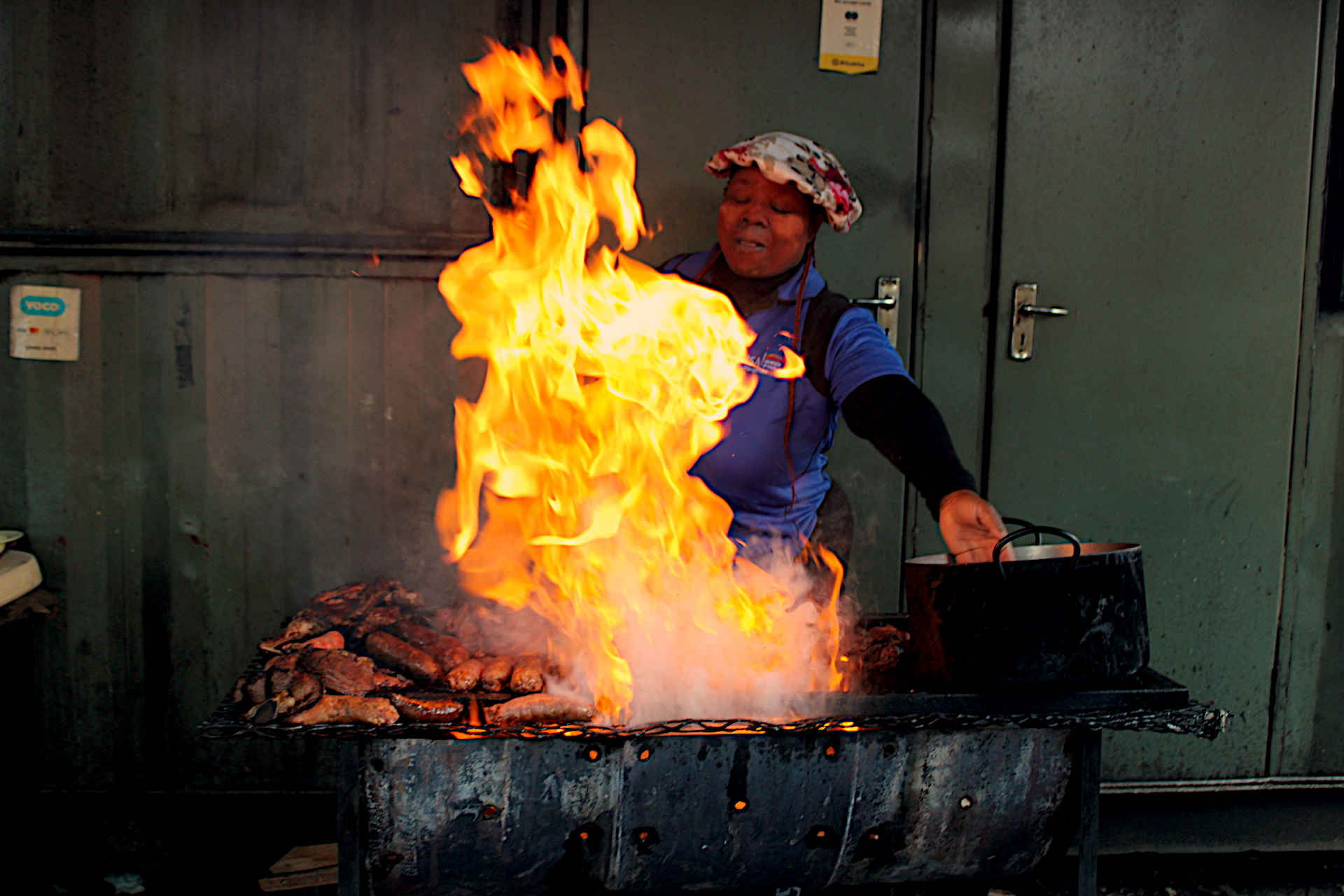
She cooks chicken, all kinds of red meat such as beef, pork and lamb, and cow-heads. Other women fry meat next to her on open barrels, and pap (a traditional porridge or polenta) cooks in big pots. People sit on trestle tables in front of them, with music and conversations filling the April air. Expensive cars fill the parking lot and people wander about with crystal glasses of whiskey in hand. The well-off and the working class mix in this market, an epitome of why Johannesburg is so cosmopolitan and authentically South African.
Mazondi has thus far never suffered illness from cooking on an open fire. She says the yellow clay mask all the women wear protects them from the smoke. If the smoke gets too much, the vendors use a cloth mask.
The red clay pastes are called letsoku in Sotho culture and ibomvu with Nguni people. They are used by both women and men in traditional ceremonies. Ibomvu and lighter-colored clays are also used as sunscreen. Like her name, her food promises sated customers.
Shepherd Changi
On a bustling street in the charming residential suburb of Melville, Johannesburg, sits a bead worker on an upturned bucket, turning beads and wire into fully-fledged animals. Shepherd Changi, 49 years old, has been making beaded figures and figurines since 2000.
When he was in Harare, Zimbabwe, he saw his friends making these items, so joined them to learn. Now, as an economic migrant here, he works his craft and has customers whose favorites are his beaded chickens. His personal favorite is the beaded bull.
On a good month, Changi will make R5,000 ($259), sitting in Melville from Monday to Sunday selling his wares. The work needs intense focus.
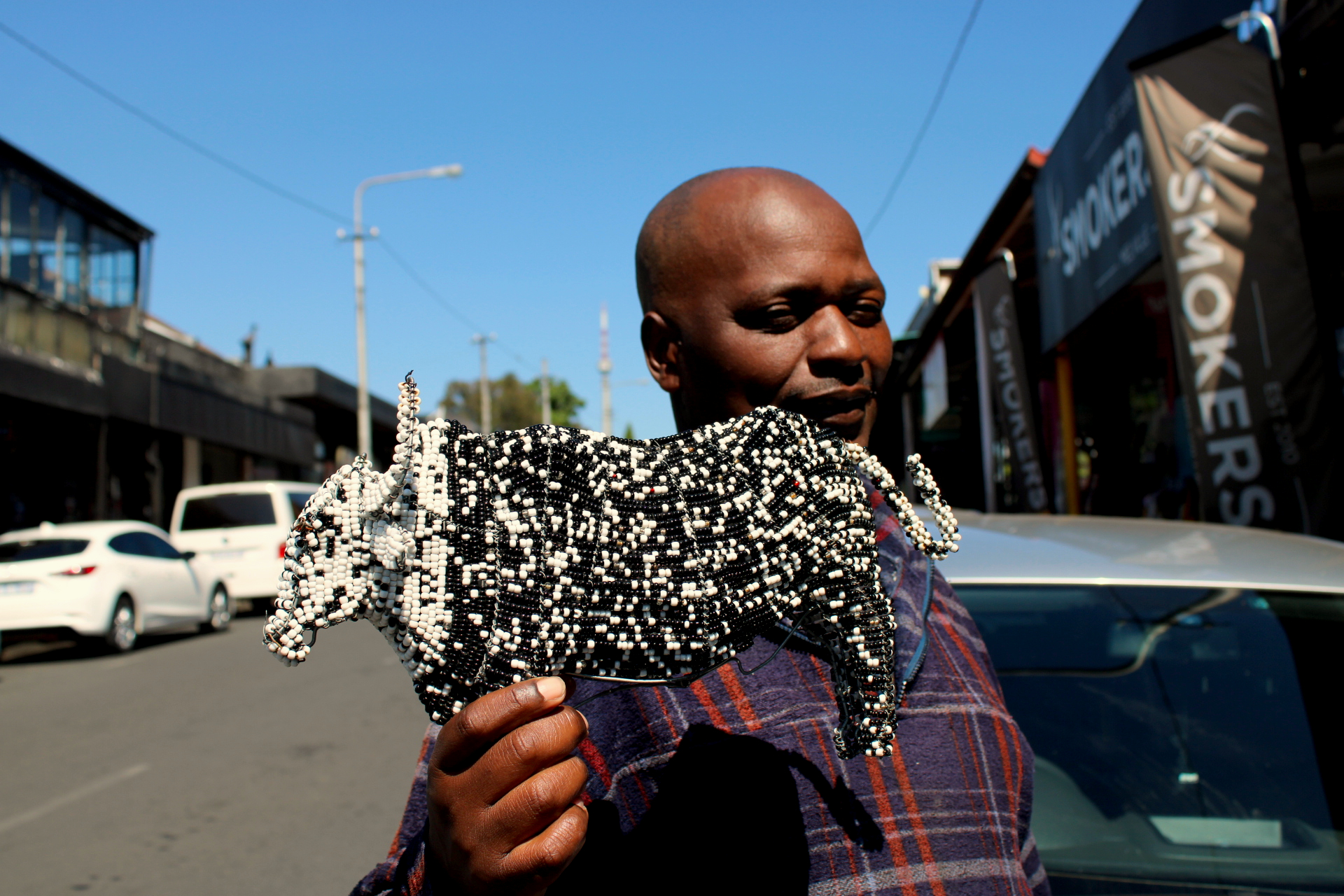
“It’s also hard on my hands,” Changi says to FORBES AFRICA of the recyclable wire goods, made with aluminum. He creates everything from small keychains to wire and bead trees, and intricate animals.
Bead work was one of the first decorative artistic endeavors by people. Archaeologists working in the Blombos cave in South Africa uncovered perforated marine shell beads made approximately 75,000 years ago. During the 19th and 20th centuries, European colonizers also brought glass beads, which have intertwined with indigenous African art since then.
Samuel Muzumbi
In between a busy bar and a corner shop of Melville, Johannesburg, stands a quality leather stall bursting with wallets, sandals, bags, and belts. Samuel Muzumbi, aged 39, has been perfecting his craft for 14 years. He likes to collaborate with others on ideas. He works six days a week at the same stall, from Monday to Saturday.
Muzumbi is originally from Harare, Zimbabwe, and started doing bead work and paintings, eventually learning how to make sandals. “I gained more experienced and did repairs,” he tells us.
“Business has been quiet after Covid. I need capital [to go] ahead and make more,” he rues.
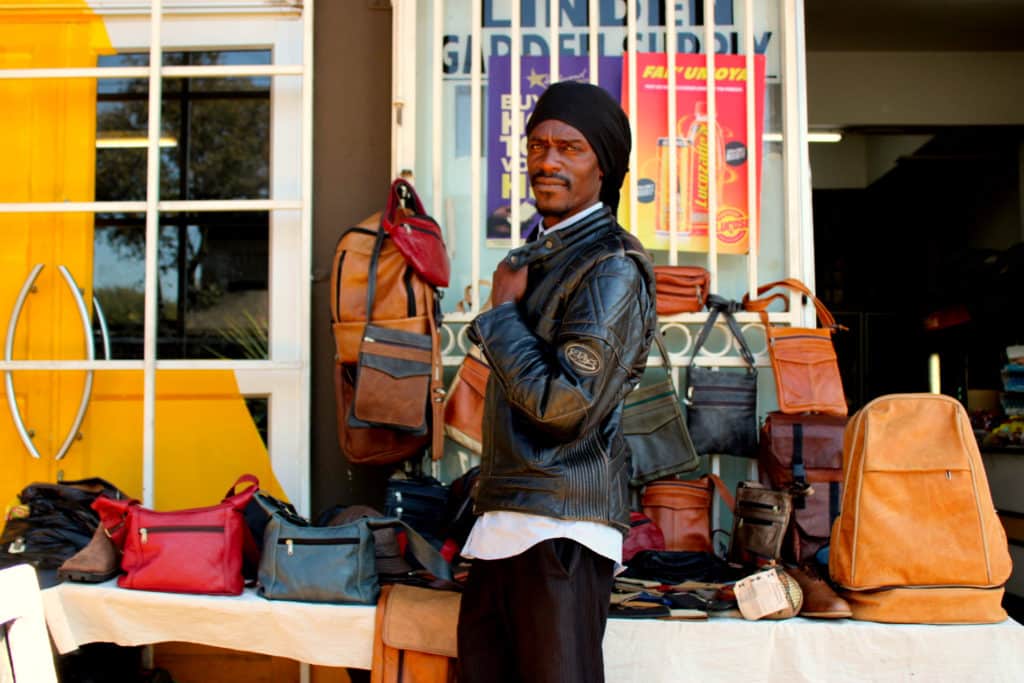
His leather goods range in beautiful hues, from sandalwood brown, to red and blue, and dark brown.
Formal international trade in leather and leather goods is estimated at over $50 billion a year. Africa has around 15% of the world’s cattle population, and 25% of the world’s sheep and goat population. Despite this, the continent accounts for only 8% of the cattle hide production, and 15% of the goat and sheepskins, according to Africa Business Pages. While leather is ranked as high in importance for export in Africa, leather products account for less than 4% of total exports, due to the unorganized nature of the sector.
Thabang Tlou
In the temperate autumn sun of Johannesburg, sitting under a tree with a chair and some boxes is one of Johannesburg’s staples – a fruit and sweet vendor, one of the only ways people have access to fresh fruit on their way to and from work.
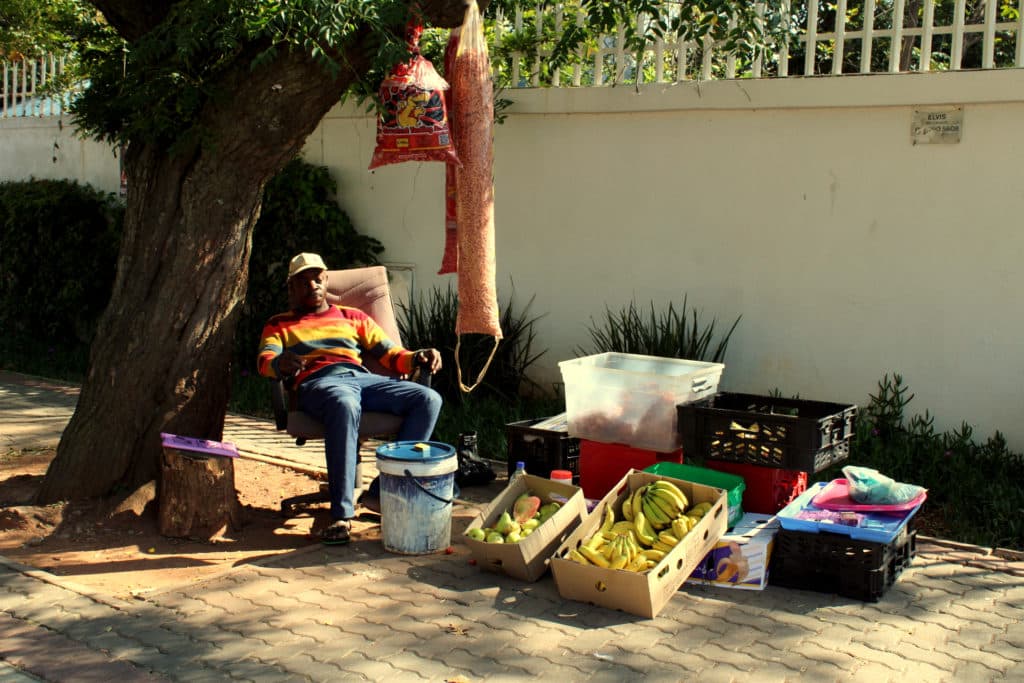
Thabang Tlou, 32, sells whatever fruit is in season; plums, bananas, naartjies, apples, avocados. He also sells sweets and chips, and repairs shoes. Hailing from the Limpopo province of South Africa, he began by repairing shoes in 2015 before incorporating a food stall into his work. He makes around R450 ($23) per day. He fixes anything from boots to sandals to high heels. Fruits are the most popular item with customers, followed by sweets.
“It’s harder in the winter time,” Tlou says to FORBES AFRICA of the struggles of working outdoors. He works at the stall in Westdene from Monday to Thursday, and Saturday he works in Brixton, a suburb close by. Tlou wakes up at 5AM to arrive at his preferred spot by 7AM, leaving only at 6PM.
Pritch Nzirah and Margaret Gwindi
At the ‘dog walking entrance’ of Emmarentia Dam are Margaret Gwindi, 51, and Pritch Nzirah, 34, greeting all the regular dog-walkers – as well as their dogs – by name. This mom and son duo sells handmade dog beds of all sizes, patterned tablecloths, cat beds, stuffed toys, oven mitts, aprons, tote bags, and car dust bins. Both come from Harare, Zimbabwe.
In the pre-Covid days, they made R8,000 ($415) a month, but now they are selling what they can to put food on the table. “These days, it’s been quiet,” says Nzirah to FORBES AFRICA, as he goes off to greet another dog.
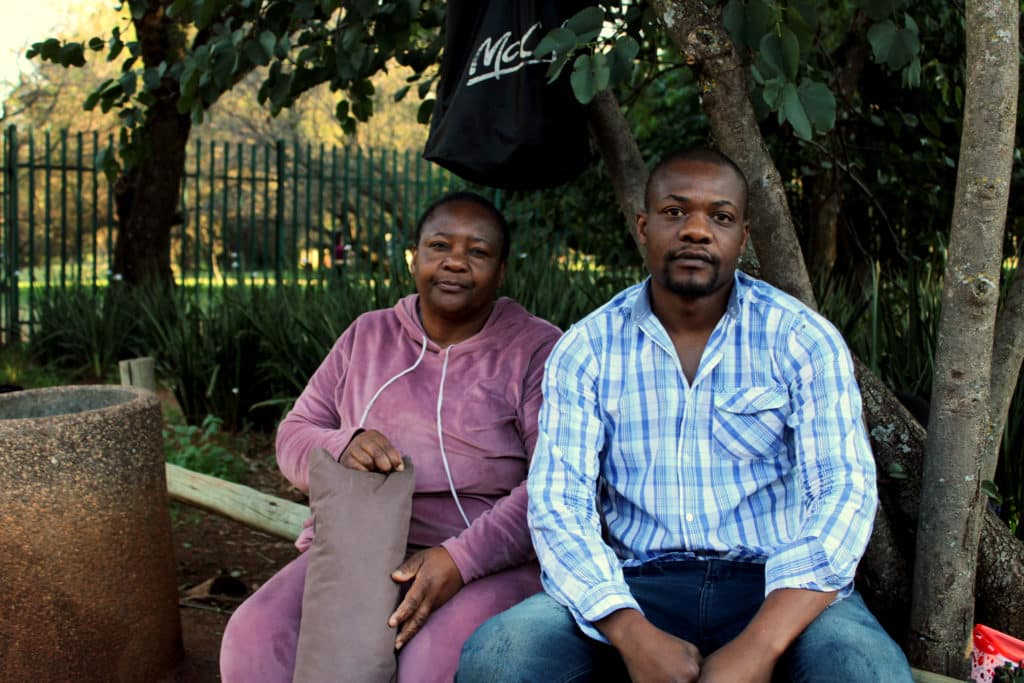
Gwindi has been making and selling handcrafted items for almost 12 years. She began with selling other people’s designs for table cloths, and someone suggested to her that if she could replicate them, she could make a business.
“So I copied the sample, and I starting making them [myself],” says Gwindi, holding a sewing needle and an almost finished dog bed in her hands. She also repairs clothes, as she is an experienced seamstress.
They used to come to Emmarentia seven days a week, but with income becoming precarious, and transport being expensive, they usually only do weekends now. On weekends they bring their entire range of stock, and on Thursdays they bring the basics. Otherwise, they work door-to-door selling their wares.
“Most people go to big malls and shops, forgetting their local businesses,” says Nzirah, sadly.
Thando Sithole and Isabel Sithole
The Smart Perfect Coffee stall sees a steady stream of dog-walkers at Emmarentia Dam arriving to get a takeaway cappuccino or iced coffee during summer. Thando Sithole and Isabel Sithole are a married couple, making a mobile business work too.
They both come from Bergville, a small town in KwaZulu-Natal. Isabel was a barista before starting a business with her husband. “I had the passion,” she says to FORBES AFRICA of why they began their own coffee stall. They took out a loan to afford equipment and get the ball rolling.
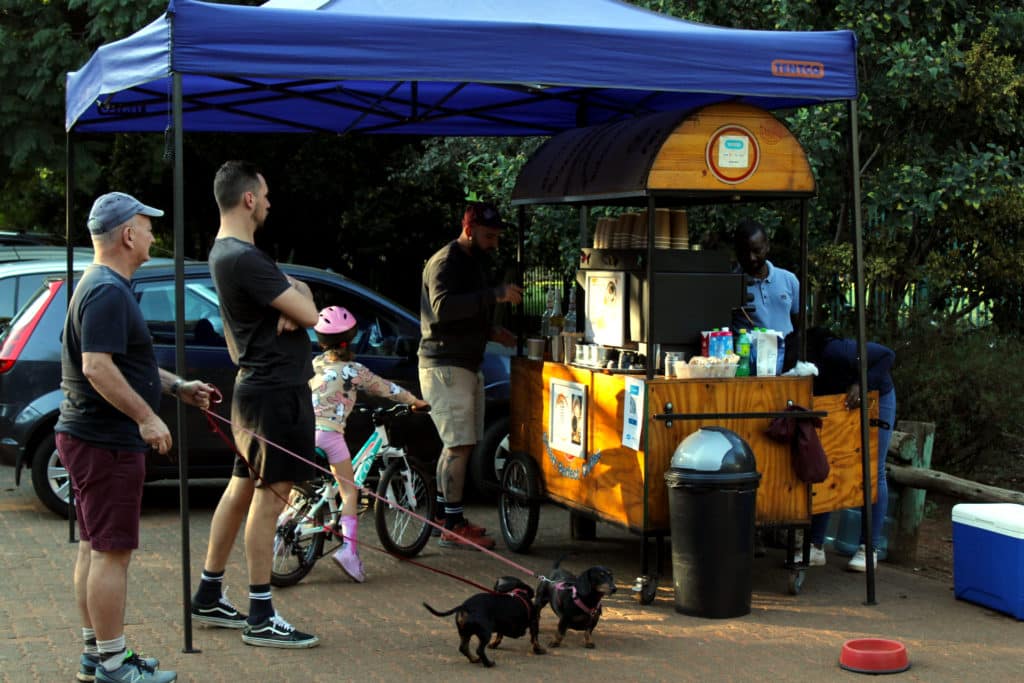
Now, they have been running Smart Perfect Coffee for five years, working at Emmarentia for a year now. They also do events, and offer Snapscan, cash or card as payment methods. Beyond coffee, they also make sure there is a water bowl for all the hot and tired dogs on their way out of the park.
Cappuccinos are their most popular drink. Their iced coffees are perfect for a hot day doing the full loop around the park.
“Business is not always the same. There are dark days and bight days, so you just have to be persistent,” Isabel concludes.
Cloe Berry
A DJ sets the mood at The Playground market in Braamfontein in the Johannesburg CBD, while people mill around sipping drinks, painting canvases, and perusing artisanal stalls. A hotspot for tourists and locals, the market brings the best daytime vibes for all ages, a must-see for showcasing African talent.
At the top level of The Playground is a stall that inevitably attracts people.
Cloe Berry and Aubrey Berry are a brother-and-sister operation, selling painted clothes in 27 Boxes at Melville during the week and The Playground market on Saturdays. The Berry siblings also have a strong social media presence on both Instagram and Facebook.
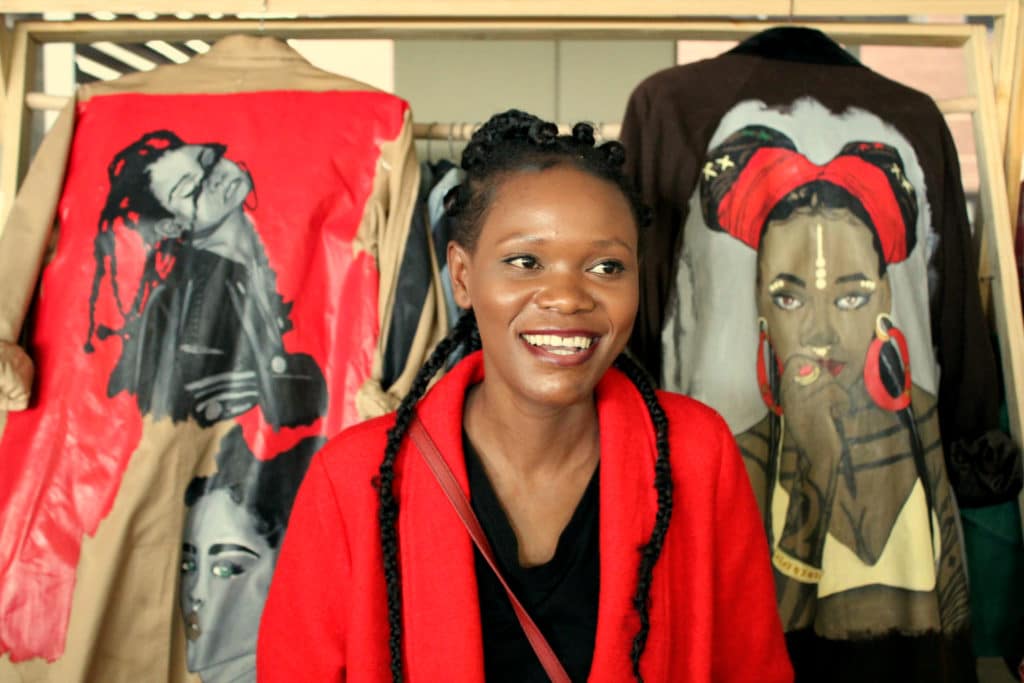
“I was just interested in it. I love collecting stuff,” Cloe says to FORBES AFRICA of how she got started. During her learning curve with painting clothes, she acquired a sewing machine.
If they don’t make a sale, they have to buy paint and equipment which can be a struggle, says Aubrey. On their best days, they make R10,000 ($518). Coming from Zambia eight years ago, they have been selling African stylized portraits on jackets and trench coats at The Playground for two years.
Loading...
